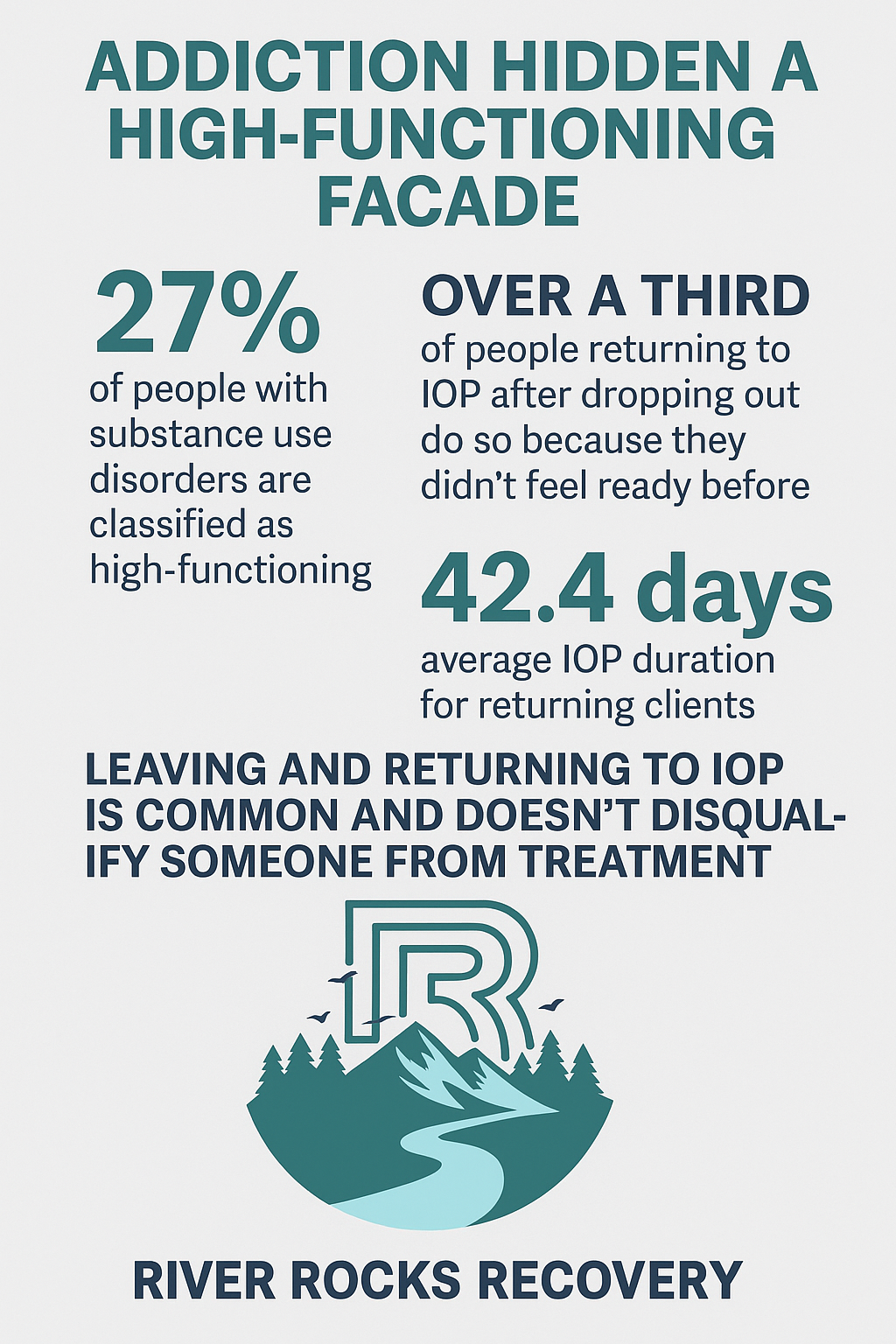I didn’t fit the stereotype. I held down a job, kept my bills paid, smiled in pictures. But I was also spiraling in secret—drinking just enough to function, numbing just enough to cope, and controlling just enough to stay hidden.
That worked until it didn’t. And when it all caught up to me, it wasn’t a dramatic crash. It was smaller than that: a missed meeting, a cracked lie, a moment I couldn’t hold it together anymore. That’s when I finally gave IOP a real shot—and this time, it worked.
I Perfected the Art of High-Functioning Hiding
People saw my surface: responsible, articulate, presentable. They didn’t see me sneaking drinks in the garage, avoiding social events that might expose me, or rewriting calendar invites to cover therapy sessions I was too ashamed to attend.
I knew how to deflect concern. I knew how to smile just enough. I told myself I was “managing,” not addicted. But every day felt like wearing a mask that got heavier by the hour.
Keeping up appearances became my full-time job—and recovery didn’t seem like something someone like me needed. Until it did.
I Tried to Quit on My Own (Again and Again)
I had willpower. I had spreadsheets. I had apps and accountability buddies and bargain-based promises: “Just through the weekend,” “Only after work,” “Just one more time.”
Each attempt would start strong—until something hard hit. A breakup. A missed promotion. A quiet Sunday that felt too loud in my head. And I’d cave, again.
What I didn’t realize back then was that quitting alone wasn’t failing—it was isolating. And I didn’t need more control. I needed connection.
What Made Intensive Outpatient Treatment Different
I stumbled across the idea of an intensive outpatient program after Googling “treatment without rehab.” I was desperate but not ready to disappear into inpatient. IOP felt like a compromise at first—but it ended up being the thing I needed most.
Here’s why:
- Structure without full detachment: I could go to treatment and still keep my job.
- Group support without groupthink: It wasn’t just lectures—it was real stories, real reactions, real growth.
- Flexibility with accountability: I had a schedule and expectations, but also the grace to be human.
Places like the intensive outpatient program in Middletown, Ohio met me in that middle space—where I could be raw without being ruined.
The First Time I Left, I Thought That Was It
I showed up for the first few weeks. I was quiet but there. Then one day, I just… didn’t go. No text. No explanation. Just shame and silence.
I told myself I didn’t belong there. That maybe I wasn’t “bad enough.” That I’d wasted a spot. The truth? I was scared to keep going. Scared to be seen.
And that’s when something unexpected happened.
A few weeks later, someone from the program sent a message. Just: “You’re still welcome if you want to come back.”
No pressure. No guilt. Just a door held open.
That moment changed everything.
Coming Back Wasn’t Easy—But It Was Real
Walking back into group after ghosting felt like walking into a fire—until it didn’t. No one asked me to explain myself. No one grilled me on where I’d been.
One person said, “Glad you’re back.” Another nodded.
That was it. And that was enough.
Because the hardest part of recovery isn’t detox. It’s facing the version of yourself you’ve been hiding—from others, and from yourself.
And IOP gave me the courage to do that—over and over, until I didn’t flinch anymore.
What I Learned by Finally Telling the Truth
The turning point came on a rainy Tuesday. We were going around the group, checking in. I said it without thinking: “I’ve been hiding this for a decade. And I don’t know how to let people help me.”
Silence. Not awkward—sacred.
Someone across the circle said, “Me too.”
That cracked something open in me. Not in a dramatic, movie-moment way. Just enough to breathe deeper. Just enough to tell the truth the next day. And the next.
Because healing doesn’t always start with rock bottom. Sometimes it starts with a quiet admission in a fold-out chair on a Tuesday night.
Thinking of Ghosting Your IOP? Read This First
Maybe you’ve stopped going. Maybe you’re skipping more sessions than you’re attending. Maybe you’re about to walk out and not come back.
Here’s what I want you to know:
- You’re not disqualified.
- You don’t owe a perfect return.
- The door is still open.
Whether you’re looking for help in Middletown, or need a nearby intensive outpatient program in Dayton or West Chester, you’re not alone. And no, you don’t have to explain the gap. You just have to walk through the door.
Quick Tips for Coming Back After Dropping Out
- Start with honesty: A simple “I wasn’t ready yet” is enough.
- Ask for what you need: Fewer sessions? A different group? Say it.
- Set one goal for your first week back: Just showing up counts.
- Remember—most people relapse or drop out once. You’re not the exception.
FAQ: Intensive Outpatient Program (IOP) for People Who’ve Ghosted
What if I already left the program without saying anything?
You’re still welcome. Most treatment teams—including River Rocks Recovery—understand that disappearing is often part of the process. You don’t need to apologize. You can just call and ask to come back.
Do I have to start over from the beginning?
Not always. It depends how long you were gone and what phase of the program you were in. But either way, restarting isn’t a punishment—it’s an opportunity to go deeper with more awareness.
What if I’m using again?
That’s exactly why you should come back. IOP isn’t about perfection—it’s about progress. If you’re actively using again, they’ll support you through it. No judgment. Just steps forward.
Is it normal to leave and return?
Absolutely. Many people leave and come back more than once. What matters is not how many times you leave—it’s that you find your way back.
Can I change programs or locations?
Yes. River Rocks offers programs in Middletown and serves surrounding areas like Monroe and West Chester. If you need a different schedule, a different group, or just a fresh start—they’ll help make that happen.
Still wondering if you’re allowed back? You are.
Call (888) 905-6281 or visit to learn more about our intensive outpatient program services in Middletown, Ohio. Whether it’s your first time—or your fourth—we’re ready when you are.





























